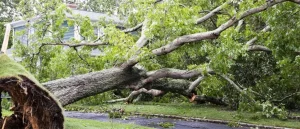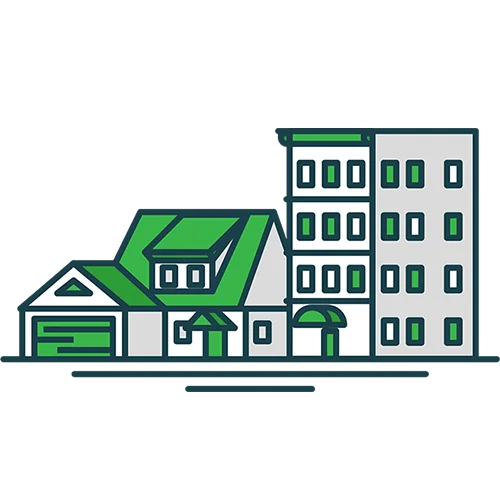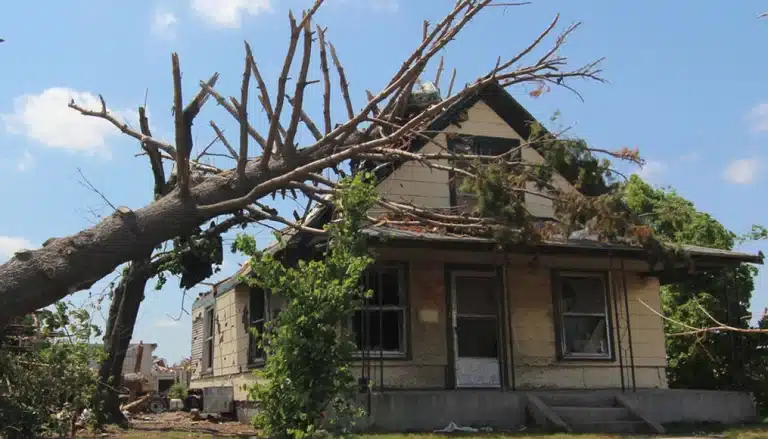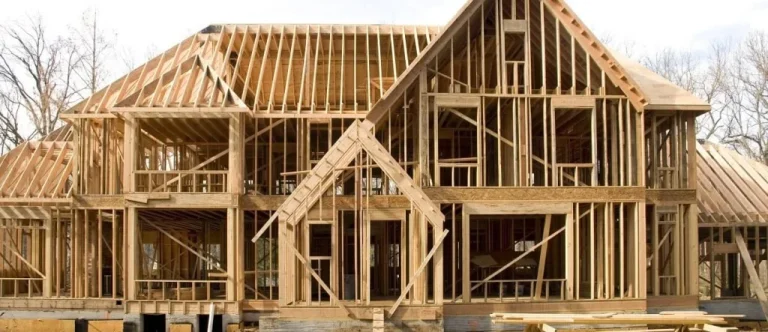Trees giveth and taketh away. They make your property look spectacular, but they can also damage it. If the trees on your property come crashing down on your or your neighbor’s property, homeowners insurance could step in to save the day.
Whether or not home insurance helps largely depends on whether the tree damages anything and whose tree fell. Let’s take a look at some common scenarios of tree damage and whether or not they’re covered by your policy.
If My Tree Falls on My Neighbor’s House, Who Is Responsible?
Who is responsible for trees falling on your neighbors’ houses depends on whose property the tree fell from. The owner of the property the tree was planted on and fell from is usually held liable for any damages it causes.
So, if you own the property and a tree from your yard falls on your neighbor’s property, you’d be responsible for paying the damages.
If your assumption is my tree fell on my neighbor’s property or yard, therefore, I’m responsible, that’s a safe assumption. However, there can be some debate as to who’s liable if the tree was planted by a previous homeowner and toes the property line.

It’s Time to Switch Your Homeowners Insurance
We partner with the nation’s top homeowners insurance companies so you can get a custom policy at an affordable price.
How Does Homeowners Insurance Cover a Tree Falling on a Neighbor’s House?
If you’re wondering who is liable for a tree falling on your neighbor’s house, unattached structures on their property, or personal belongings, if it’s your tree, it’s your homeowners insurance policy that’s on the hook to pay to repair the damages.
Home insurance covers property damage when the damage results from a covered peril. The most common way for a tree to fall is due to a windstorm, which is often a covered peril. The part of the policy that is active depends on what was damaged. Here’s what you need to know about the parts of your policy that may help you in this situation.
Dwelling Coverage
If your own tree falls on your own home, your policy’s dwelling coverage will step in to pay for the damages to your home. If a neighbor’s tree falls on your home, their insurance should cover the damage. However, if they don’t have home insurance, things can get sticky.
In the event they don’t have home insurance on the property, your policy’s dwelling coverage could still kick in to pay for the repairs. If things like a fence were destroyed, it would be other structures coverage kicking in. And if your personal belongings were destroyed, it would be personal property coverage kicking in.
But if your neighbor’s tree damages anything, we highly recommend having them file a claim against their insurance to fix everything. Filing a claim against your insurance would increase your premiums, and you’d still have to pay your deductible before insurance kicks in. That’s just not fair to you.
If they own the home, they’ll likely have homeowners insurance. But even if they rent the home, their landlord should have landlord insurance. In either scenario, there’s no sense in paying for damages someone else is liable for. That’s why they have liability coverage.
Liability Coverage
If your tree falls on a neighbor’s property, or if your neighbor’s tree fell on your property, the part of any home insurance policy that would likely step in to pay for the repairs is liability coverage.
Liability coverage is included in every home insurance policy, so the person who owns the property from which the tree fell should have coverage. It’s designed to pay for accidental damage caused to other people’s property, among other things.
In this instance, it could pay for any damage a tree causes to a neighbor’s house, structures on their property, and personal belongings. Policies typically come with at least $100,000 in coverage. Unless the tree comes crashing through a neighbor’s roof and damages half their home, that should likely be enough coverage to pay for the home insurance claim.
However, if the tree wasn’t properly maintained, any insurance company could deny the claim altogether. They can deny claims due to improper upkeep, lack of maintenance, and general negligence. So if the tree was tilting out of the ground for some time, or if you made a wrong move while cutting down the tree yourself, you could be out of luck anyway.
If My Tree Falls on My Neighbor’s Fence, Who Is Responsible?
Homeowners insurance, namely other structures coverage, will cover damage to a fence caused by a fallen tree if the tree fell due to a covered peril. When a tree branch falls on a neighbor’s property, or a whole tree, falls from your yard onto your neighbor’s fence, you are responsible for the damages.
Luckily, if it was just a branch, you’re likely to see minimal damage that could be easily fixed out of pocket. However, if your tree damaged your neighbor’s property when it was downed during a storm and totally ruined their fence, know it’s your responsibility to pay to repair or replace it either with your policy or out of pocket.
If My Neighbor’s Tree Falls on My Property, Who Is Responsible?
When a neighbor’s tree falls on your property, the person held legally and financially responsible is the property owner from which the tree fell. So, if it was your neighbor’s tree, they’re responsible for paying for the damages to your home or property.
If your neighbor has a homeowners insurance policy, their policy should cover the damages they owe to help you repair the damage from the fallen tree. However, if they don’t have a homeowners insurance policy, things can get a bit messy. Your neighbor is still liable for damage to your property, so they’ll be expected to pay, even if that is out of pocket.
If your neighbor doesn’t have property insurance and is liable for damage to your property out of pocket but can’t afford the cost, how you proceed is up to you. You could pursue legal action.
If a Tree Falls on Rental Property, Who Is Responsible?
If the tree fell from a neighbor’s yard onto your rental property, the neighbor would still be liable.
However, if you’re the property owner and your own tree falls on your rental, you, as the landlord and homeowner, are responsible. You should have landlord insurance, which still provides dwelling, other structures, and liability coverages.
If your neighbor’s tree fell on your house and your neighbors rent the home, their landlord should have landlord insurance. The landlord is liable for damages in this situation.
Who Is Responsible for Fallen Tree Removal?
If a tree falls due to a covered peril and damages property, the insurance company in which the claim was filed will likely also pay a specific amount for tree removal. While a tree falling on your house can be dangerous, tree removal can get expensive and liability for that removal can get convoluted.
If no damage occurred when the tree fell, insurance likely wouldn’t foot the bill for removal. Instead, the owner of the property from which the tree fell would be financially responsible.
Ultimately, if it was your tree, you’re responsible for the damages. If a dead tree from your property falls on your neighbor’s property, since you’re liable for damage to their property, it’s likely covered by your liability coverage on your homeowners insurance policy.
Note that insurance won’t typically pay for run-of-the-mill dead tree removal, as trees generally die slowly over time, not due to a peril covered on your policy.

It’s Time to Switch Your Homeowners Insurance
We partner with the nation’s top homeowners insurance companies so you can get a custom policy at an affordable price.
Who Pays for Tree Removal on the Property Line?
The property owner from which the tree came is liable for its removal. If the trunk and the roots of the tree bisect the property line, discerning who is responsible for a fallen tree can get a little hairy.
Legally, either neighbor can do what they want when it comes to the tree, from trimming to removal. So, if a tree from the property line falls and doesn’t damage property, either or both property owners are liable for removing the tree.
However, if a tree from the property line falls during a storm and damages either property, liability for damages depends on whose property is damaged. If the tree damages your neighbor’s property, your liability coverage would likely cover it, and vice versa.
Can I Sue My Neighbor for Tree Damage?
Yes, you can sue your neighbor for tree damage if a tree from their property damages your property, although this shouldn’t be needed if they have home insurance.
As we’ve stated, if a tree falls from another property, the responsibility to rectify the damage falls to whomever’s property from which the tree grew. Generally, pursuing coverage from insurance for damages caused by a tree is quicker and easier, but if your neighbor lacks a homeowners insurance policy and can’t cover the damages out of pocket, you can pursue legal action.
Remember, you only have a case if your property is damaged. So, if your neighbor’s tree falls onto a clear patch of your lawn, their policy wouldn’t cover that anyway, so it may not be worth legal action in such a case.
What Happens If My Neighbor’s Tree Fell on My House and I Have No Insurance?
Luckily, if a tree or limbs from a neighbor’s tree are falling on your property or house, that would be covered by your neighbor’s policy, so you don’t need insurance to cover that.
While you may not need your own policy for this specific situation, it is a good idea to maintain homeowners insurance so you’re covered in the event of disaster. For example, if a tree from your property falls during a storm and damages your home, you would be out of luck without a policy.
If you’re interested in getting a homeowners insurance policy to help protect your home from falling trees or other potential dangers, you should start by gathering quotes from different insurers in your area. We can help you compare quotes, as we offer a free quoting platform you can use to get quotes in minutes.
If you’re still on the fence (no pun intended), you can contact one of our licensed agents at 833-255-4117 or agent@clovered.com to discuss your concerns with a professional.
The editorial content on Clovered’s website is meant to be informational material and should not be considered legal advice.




